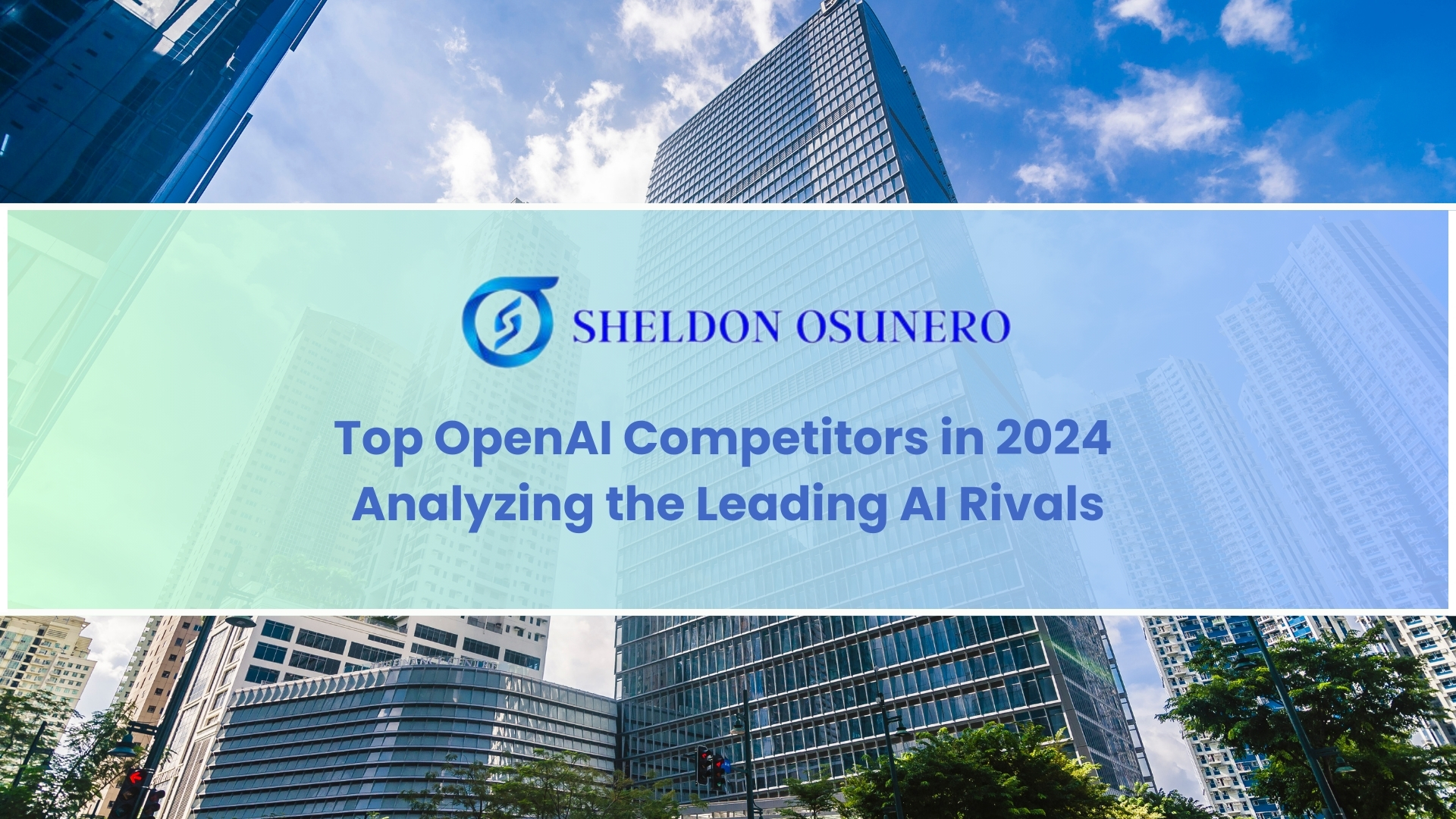OpenAI competitors are gaining ground as artificial intelligence (AI) continues advancing at a rapid pace. While OpenAI remains a leader in groundbreaking developments, the competition in the AI landscape is fierce. In 2024, several companies are making significant strides in AI, positioning themselves as major contenders. This blog will explore the top OpenAI competitors in 2024. We will analyze their strengths, technologies, and what sets them apart in the AI industry.
Google DeepMind
History and Evolution of DeepMind
Google DeepMind, founded in 2010 and acquired by Google in 2014, is a pioneering force in AI research. The company initially focused on mastering complex games like Go and chess, demonstrating AI’s potential. DeepMind’s AlphaGo program defeated a human world champion, showcasing its capabilities. This achievement highlighted the strength of OpenAI competitors like DeepMind. It wasn’t just about winning a game, but demonstrating deep reasoning and learning.
Key AI Projects and Breakthroughs
Beyond gaming, DeepMind has achieved groundbreaking advancements in AI. AlphaFold, an AI system predicting protein folding, is a prime example. This innovation was hailed as a significant scientific breakthrough. Other projects include AI systems for energy efficiency in data centers. DeepMind also develops neural networks that generalize knowledge across various domains.
Comparison with OpenAI’s Technologies
DeepMind and OpenAI focus on different AI aspects. While OpenAI excels in natural language processing (NLP), DeepMind specializes in reinforcement learning. OpenAI’s work is more consumer-facing, like ChatGPT. On the other hand, DeepMind’s AI addresses complex scientific challenges. OpenAI competitors like DeepMind share the same goal: advancing AI’s boundaries.
Future Prospects for Google DeepMind
DeepMind will likely continue focusing on AI applications in scientific discovery and problem-solving. With Google’s resources, it can innovate in healthcare, energy efficiency, and AI ethics. DeepMind’s approach ensures it remains a leading OpenAI competitor.
Anthropic
Founding Background and Mission
Anthropic, founded in 2021 by former OpenAI researchers, emphasizes AI safety and alignment with human values. The company’s name reflects its mission: creating AI systems that prioritize ethical development. This focus positions Anthropic as a crucial OpenAI competitor.
Ethical AI and Safety-Focused Developments
Ethical AI is at the core of Anthropic’s mission. They develop AI models emphasizing interpretability, fairness, and safety. This approach makes Anthropic distinct among OpenAI competitors. They work on AI that can explain its decision-making, reducing biases and risks.
How Anthropic’s AI Approaches Differ from OpenAI
Anthropic and OpenAI share a commitment to advancing AI but with different approaches. OpenAI focuses on scaling AI models for greater capabilities. In contrast, Anthropic emphasizes safety and alignment with human intentions. This difference sets Anthropic apart as a thoughtful OpenAI competitor.
Impact on the AI Landscape and Potential Growth
As AI concerns grow, Anthropic’s focus on safety positions it for significant attention. Their growth potential lies in developing powerful, trustworthy AI systems. Among OpenAI competitors, Anthropic’s commitment to ethical AI could attract strong support from policymakers and the public.
Microsoft AI
Overview of Microsoft’s AI Initiatives
Microsoft AI is a major force, integrating AI across its vast product ecosystem. Their initiatives cover cloud-based AI services, productivity tools, and more. Microsoft is a prominent OpenAI competitor with deep AI research in natural language processing and computer vision.
Strategic Partnerships (e.g., with OpenAI) and Their Significance
Microsoft’s partnership with OpenAI is a strategic move in the AI space. Microsoft made a $1 billion investment in OpenAI in 2019. They also became OpenAI’s exclusive cloud provider through Azure. This collaboration has bolstered both companies as OpenAI competitors.
Microsoft AI’s Influence in Various Industries
Microsoft’s AI technology is influential across various industries, including healthcare and finance. In healthcare, Microsoft AI aids in medical imaging and personalized treatment. Their AI-driven analytics help finance companies manage risk and detect fraud. This broad impact solidifies Microsoft as a leading OpenAI competitor.
The Role of Microsoft in Shaping AI’s Future
Microsoft is positioned to shape AI’s future with its resources and reach. They focus on responsible AI, developing ethical guidelines and principles. Microsoft’s ongoing AI research and strategic partnerships ensure its place among the top OpenAI competitors.

IBM Watson
Evolution of IBM Watson and Its AI Contributions
IBM Watson gained fame in 2011 by defeating human champions on Jeopardy! Watson demonstrated AI’s potential in natural language understanding. Since then, Watson has evolved into a comprehensive AI platform. It offers services in machine learning, data analysis, and automated decision-making, becoming a key OpenAI competitor.
Major Applications in Healthcare, Finance, and More
Watson has significant applications in industries like healthcare and finance. In healthcare, it assists in diagnosing diseases and analyzing medical data. In finance, Watson helps manage risk and improve customer service. Watson’s strength in practical applications makes it a formidable OpenAI competitor.
IBM Watson’s Competitive Edge Compared to OpenAI
While OpenAI is known for cutting-edge AI models, Watson excels in practical business applications. Watson integrates seamlessly into operations, providing industry-specific AI solutions. This focus on real-world applications gives Watson a competitive edge among OpenAI competitors.
Innovations and Future Direction of IBM’s AI
IBM continues to innovate with Watson, enhancing its capabilities in explainability and transparency. IBM aims to integrate Watson with emerging technologies like quantum computing. This approach keeps Watson relevant as an OpenAI competitor in a rapidly evolving field.
Meta AI (formerly Facebook AI)
Meta’s AI Journey and Major Milestones
Meta, formerly Facebook, has invested heavily in AI research for years. Meta AI’s journey includes developing powerful image recognition algorithms. They also made significant advancements in natural language processing. These achievements place Meta AI among top OpenAI competitors.
Key Projects and Contributions to AI Research
Meta AI contributes to AI research areas like computer vision and reinforcement learning. Notable projects include the development of FAIR (Facebook AI Research) models. Meta has also been a leader in open-sourcing AI tools, supporting the broader AI community. Their efforts strengthen Meta’s position as a leading OpenAI competitor.
How Meta AI Compares with OpenAI in Specific Domains
Meta AI and OpenAI have different strengths. OpenAI leads in generative AI and NLP, with models like GPT-3. Meta AI excels in computer vision and AI for social media applications. Both are leaders, but Meta’s AI work aligns closely with social networking. Meta’s focus makes it a distinct OpenAI competitor.
Future Vision and Challenges for Meta AI
Meta’s AI vision is linked to its mission of building the metaverse. AI will be crucial in creating and managing these virtual spaces. Meta also faces challenges, including privacy concerns and responsible AI use. Addressing these challenges will be key to Meta’s success as an OpenAI competitor.
FAQs
Who are the main competitors of OpenAI in 2024?
The main OpenAI competitors in 2024 include Google DeepMind, Anthropic, Microsoft AI, IBM Watson, and Meta AI.
How does Google DeepMind compare with OpenAI?
Google DeepMind and OpenAI focus on different AI aspects, making them distinct OpenAI competitors.
What makes Anthropic different from OpenAI?
Anthropic prioritizes AI safety and alignment, making it a unique OpenAI competitor.
Is IBM Watson still relevant in the AI industry?
Yes, IBM Watson remains a relevant OpenAI competitor with its practical applications in industries like healthcare and finance.
How does Microsoft AI collaborate with OpenAI?
Microsoft AI collaborates with OpenAI through strategic partnerships, strengthening their positions as OpenAI competitors.
Conclusion
As the AI industry grows, the competition between OpenAI and its rivals intensifies. Each OpenAI competitor—Google DeepMind, Anthropic, Microsoft AI, IBM Watson, and Meta AI—brings unique strengths. Understanding these competitors provides insights into the future of AI. The technologies they develop will shape our world in profound ways.








